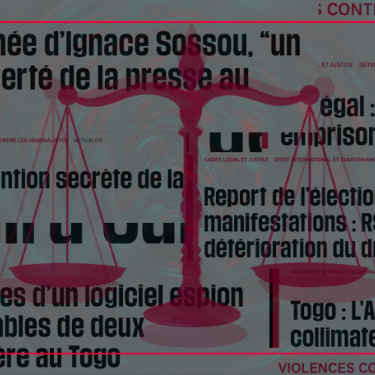RSF creates network of lawyers to protect journalists in West Africa

Reporters Without Borders (RSF) is creating a network of lawyers who will offer legal assistance to journalists in West Africa in the event of their arrest and will refer cases to regional legal bodies when appropriate.
This is a significant initiative for West Africa’s journalists, especially investigative journalists, who often pay a high price for their reporting and their revelations, who are liable to be hounded, physically attacked and arbitrarily arrested.
Ten lawyers gathered by RSF have undertaken to provide legal assistance and defend journalists who are arrested arbitrarily, persecuted or attacked in connection with their work. These lawyers will also meet with journalists to inform them about their rights and, when necessary, several of them will work together on the same case.
There was an urgent need for a network of lawyers to respond to the serious attacks that too often target journalists in West Africa. From Niger to Senegal, lawyers who are respected in their country have responded to our call and have undertaken to be ready when needed to provide legal assistance to journalists who are attacked in connection with their work. We salute their commitment to protecting journalists as part of this network, which will be expanded to cover all of West Africa, so that investigative journalists can be free to do their reporting.
RSF launched the network after meeting in Togo’s capital, Lomé, in February to consult with several experienced Togolese lawyers, including Elom Kpadé, who defended two investigative journalists, Ferdinand Ayité, the publisher of the online biweekly L'Alternative, and Isidore Kouwonou, L'Alternative’s editor.
Other lawyers from Senegal, Niger and Benin attended this meeting, as did representatives of such organisations as the Norbert Zongo Cell for Investigative Journalism in West Africa (CENOZO), the Collective of Associations against Impunity in Togo (CACIT) and the Togolese Consortium of Investigative Journalists (Togo Reporting Post), as well as investigative journalists who have been arrested several times in connection with their work.
Crucial need for journalists in crisis areas
Édouard Kamboissoa Samboé, a Togolese investigative journalist and publisher of the Togolese news site Laabali who has been arrested three times in the past two years while reporting, took part in the consultation. Stressing the need for more legal assistance in remote areas, he said: “I did not have the help of a lawyer and I realised that journalists based in crisis zones far from capitals absolutely must have some. Their safety depends on it.”
Network needed amid surge in press freedom violations
This initiative is more essential than ever now, says Moussa Sarr, a Senegalese lawyer who has defended several journalists including Pape Alé Niang, the director of the Dakar Matin news site, Serigne Saliou Guèye, the publisher of the daily Yoor-Yoor Bi, and Pape Ndiaye, a reporter on court cases for Walf TV.
This network is especially needed because of the increase in attacks on press freedom in West Africa, where authorities are circumventing laws decriminalising press offences while military juntas continue to harass journalists. “This network will therefore be a framework for exchanging experiences and good professional practices and pooling our efforts, with a view to ensuring effective and efficient defence for journalists who are prosecuted,” Sarr said.
Brice Houssou, a Beninese lawyer who has defended several journalists in his country, thinks that some authorities are using the endemic security threat as a pretext to impose the utmost restrictions on the rights that journalists should normally enjoy in the research, collection and dissemination of information.
“Establishing a network of lawyers for the purposes of systematic legal assistance is essential in order to help media professionals who are arrested or prosecuted for press offences,” Houssou said.
